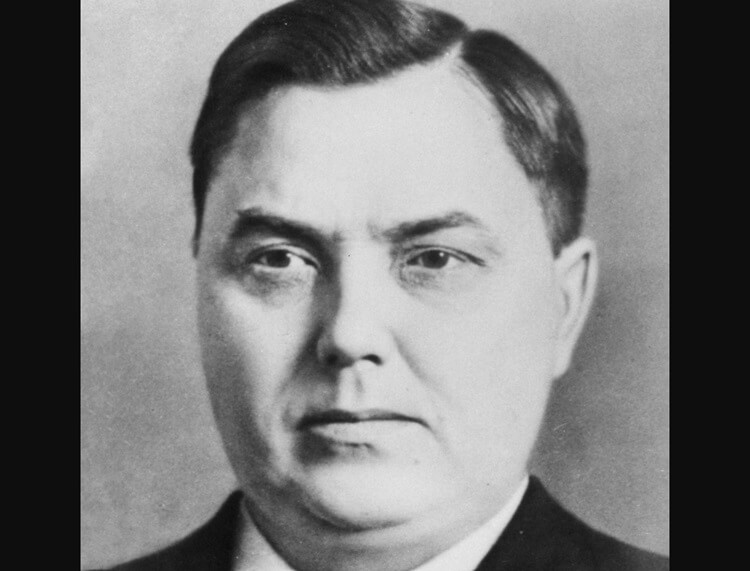Who was Georgy Malenkov? Explore the dynamic career of Georgy Malenkov, from his rapid ascent within the Soviet hierarchy to his eventual downfall and exile. Delve into his roles during World War II, his brief premiership, and the internal power struggles that shaped his political legacy within the Soviet Union.

Souce: wikipedia.org
Georgy Malenkov; (1902-1988), Soviet political leader, who was premier of the USSR in 1953-1955. Malenkov was born into a middleclass family in Orenburg (now Chkalov), Russia, on Jan. 8, 1902. He joined the Communist party in 1920 and, after graduating from engineering school in 1925, rose rapidly as a party administrator and purge supervisor. He won a post in the Secretariat by 1939 and candidate membership in the Politburo, the top party organ, in 1941. During World War II, Malenkov effectively organized aircraft production and in 1946 was promoted to full membership in the Politburo and Orgburo and to the post of deputy premier. By 1952 he was considered the heir apparent to Joseph Stalin.
On March 6, 1953, following Stalin’s death, Malenkov became head of government as premier and head of the party as its senior secretary. Within days, however, he relinquished the party secretaryship, which was to fall to Nikita Khrushchev six months later. Malenkov advocated a higher priority for the production of consumer goods, while Khrushchev won over the army with calls for the continued priority of heavy industry. Malenkov resigned as premier on Feb. 8, 1955. After participating in an effort to oust Khruschev from party leadership in June 1957, Malenkov lost his remaining high offices and was given an obscure post as manager of a Central Asian power station.
Career
In 1918, Malenkov volunteered for the Red Army and fought alongside Communist forces against the White Russian opposition during the Civil War. Joining the Communist Party of the Soviet Union (CPSU) in 1920 marked the beginning of his political journey. His early years saw him serving as a political commissar on a propaganda train in Turkestan, actively engaged in promoting Communist ideals.
Following the turbulence of the Civil War, Malenkov swiftly rose through the ranks, earning a reputation as a staunch Bolshevik. He garnered attention for his organizational skills and commitment to Communist principles. His association with Stalin began to solidify in the 1920s, as he assumed roles within the party apparatus and took on responsibilities related to personnel management and record-keeping.
By the mid-1920s, Malenkov’s trajectory intersected with Stalin’s inner circle, earning him a position within the Orgburo of the Central Committee of the CPSU. His meticulous record-keeping and close alignment with Stalin during the purges further elevated his status within the party hierarchy.
The outbreak of World War II propelled Malenkov into even greater prominence. His inclusion in the State Defense Committee alongside key figures like Beria and Molotov underscored his significance in shaping Soviet policy during the conflict. Malenkov’s oversight extended to critical areas such as military aircraft production and the development of nuclear weapons, reflecting his expanding influence within the Soviet leadership.
As the war drew to a close, Malenkov’s role in the Soviet missile program became increasingly pivotal. Tasked with overseeing the development of advanced weaponry, he prioritized technical expertise over ideological purity, a stance that placed him at odds with rival factions within the party.
The post-war years witnessed Malenkov’s continued ascent within the Soviet hierarchy. His involvement in the demotion of prominent military figures like Zhukov underscored his loyalty to Stalin and solidified his position within the Politburo. However, internal power struggles following Stalin’s death in 1953 precipitated Malenkov’s eventual downfall.
Assuming leadership roles in the aftermath of Stalin’s demise, Malenkov’s tenure as Premier was marked by attempts to pursue a more conciliatory approach towards the West and prioritize consumer goods production over heavy industry. Yet, opposition from within the party, coupled with accusations of abuse of power, ultimately led to his resignation in 1955.
Malenkov’s subsequent expulsion from the Communist Party and exile to Kazakhstan marked the end of his political career. Despite his fall from grace, he found solace in religion and retreated from the political spotlight, leaving behind a legacy intertwined with the tumultuous history of the Soviet Union.